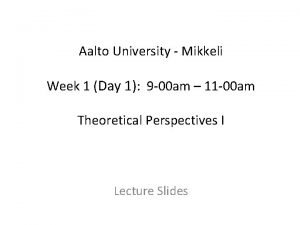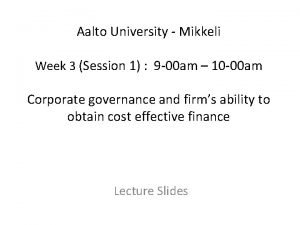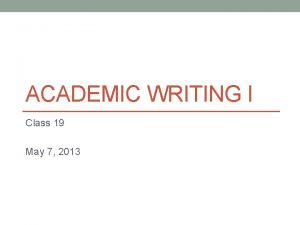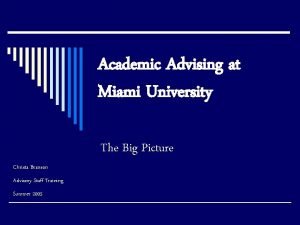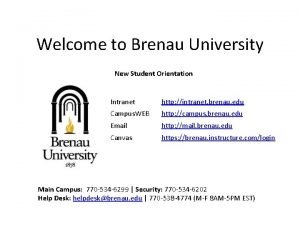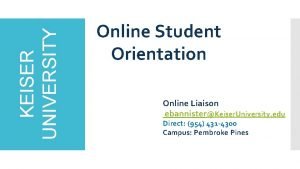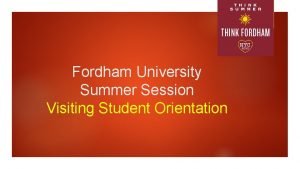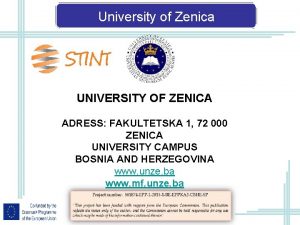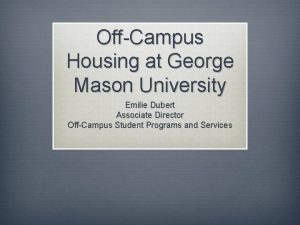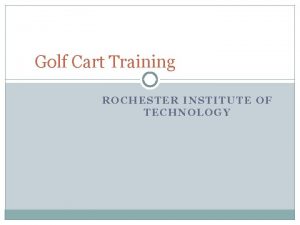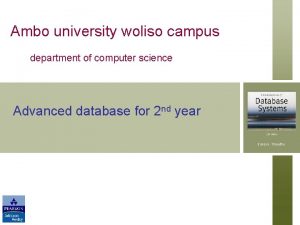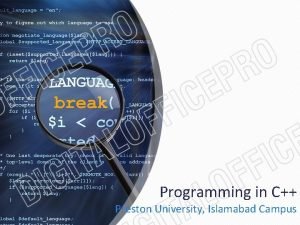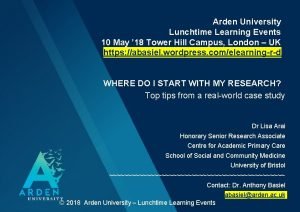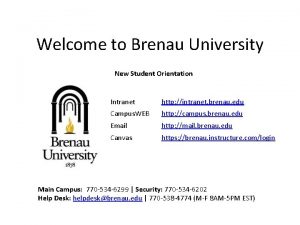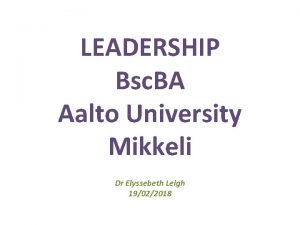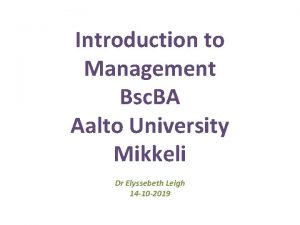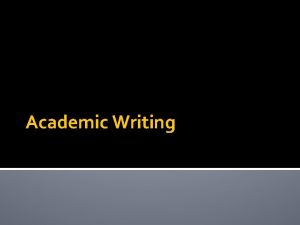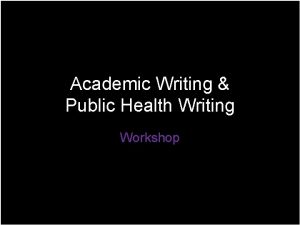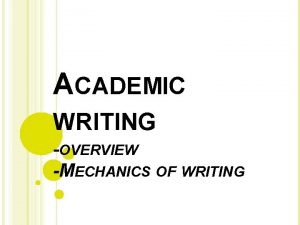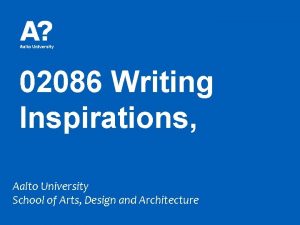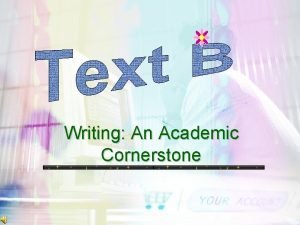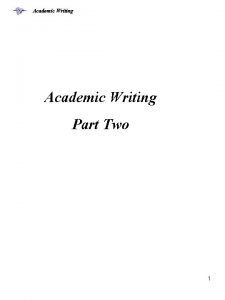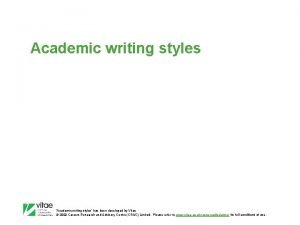Academic Writing Mirjaliisa Charles Aalto University Mikkeli campus

































- Slides: 33

Academic Writing Mirjaliisa Charles Aalto University Mikkeli campus Autumn 2019

Teaching and learning issues Writing skills are taught in all universities. FALSE If you are a good writer in your mother tongues, it is easier for you to write in a foreign language. MOSTLY TRUE You learn to write at school before university MOSTLY TRUE then you're done. FALSE It is important that I develop my own writing style TRUE and then stick to that, whatever the situation and circumstances FALSE

1) Why do universities teach writing skills? Because good writing benefits �YOU and �THE UNIVERSITY NOW and later in your professional life

Good writing skills benefit YOU because … Writing helps you to … remember what you learn consolidate facts become conscious of what you know, and what you do NOT know create an ENTITY out of bits of knowledge BESIDES … Good writers give a good impression of themselves in the professional world.

Good writing skills benefit THE UNIVERSITY because … Good writers are usually high class graduates who will contribute to the university’s reputation / brand All of which benefits YOU, too!

It's WHAT I write at university - not HOW I write it – that determines the grade I get. MOSTLY TRUE Clear, logical, well structured text … helps the reader understand what you want to say avoids misunderstandings convinces the reader that you have done serious, careful work makes the reader appreciate your thoughts and effort interests the reader

‘There are very few differences between 'academic writing' and 'ordinary writing’. MOSTLY TRUE How does academic writing differ from other kinds of writing?

All writing … targets specific types of readers / audiences is produced for a specific medium has a specific purpose observes specific layout requirements / expectations. However, …

The same people write BUT Situations differ Target audiences differ Purpose and aim of your writing differ Media differ in their requirements and user expectations

Groups of people / ‘Communities’ have their own genres of writing Examples: �the business world �the young >< the old �engineers in a specific company �Academia Think of the different kinds of writing that these communities do And the different styles (‘registers’) that you use.

‘Discourse Communities’ We all simultaneously belong to a range of discourse communities, and therefore have to adjust our writing (and our speaking!) according to different kinds of circumstances audiences purposes media expectations / requirements / standards

Communities and Genres A genre is a type of text with a specific layout, organization of information, and often specific type of language expected by the community within which it is produced. Adherence to generic conventions increases ◦ readability ◦ ease of understanding

Situations and media share genres, but also require different genres, and expect different registers. ◦ An invitation to a Probba party? ◦ Social media? ◦ A business consultant’s recommendations written to the Board of Directors? ◦ An essay answer in an exam? ◦ An invoice written in a company?

Genres that students write in universities Essays in examinations and at home Case studies Thesis and dissertations Research proposals Business plans Team work reports

You are now in an academic community… … and you are writing for and within an academic community. What are the implications for your writing? Think about the circumstances in which you are writing: How do you think they influence your writing? What purposes do you write for? Your audience: Who are your readers? What are their expectations? How do the media you use affect your writing?

6 The main purpose of academic writing is to show what you know about the subject. SOME TRUTH 7 There are very few differences between 'academic writing' and 'ordinary writing’. MOSTLY TRUE 8 The most important thing in all writing is correct grammar and spelling. SOME TRUTH 9 In academic writing, you should not express personal opinions. SOME TRUTH / FALSE

PART 2 What is Academic writing like, then?

Example: Compare texts (a) and (b) (a) “ We don't really know what language proficiency is but many people have talked about it for a long time. Some researchers have tried to find ways for us to make teaching and testing more communicative because that is how language works. I think that language is something we use for communicating, not something for us to study, and we should remember that when we teach and test it. ”

Text (b) “The question of what constitutes "language proficiency" is at the core of many hotly debated issues in the area of second language pedagogy and testing. Researchers have suggested ways of making second language teaching and testing more "communicative" (e. g. , Canale and Swain, 1980) on the grounds that a communicative approach better reflects the nature of language proficiency than a structural, grammar focused approach. ”

“ We don't really know what language proficiency is but many people have talked about it for a long time. “The question of what constitutes language proficiency is at the core of many hotly debated issues in the area of second language pedagogy and testing.

A) Some researchers have tried to find ways for us to make teaching and testing more communicative because that is how language works. I think that language is something we use for communicating, not an object for us to study and we should remember that when we teach and test it. ” b) Researchers have suggested ways of making second language teaching and testing more "communicative" (e. g. , Canale and Swain, 1980) on the grounds that a communicative approach better reflects the nature of language proficiency than a structural approach focusing on grammar acquisition. ”

Text A – informal chatty register Vague/open to different interpretations (‘people have talked about …’ / ‘language is something…’ ) Unfounded generalizations (‘that’s how language works’) Makes a recommendation based on personal opinion (‘I think that … and we should remember that…) Not logically structured (proficiency - how language works – what writer thinks language is – recommendation for teachers)

Informal, spoken style (a) “ We don't really know what language proficiency is but many people have talked about it for a long time. Some researchers have tried to find ways for us to make teaching and testing more communicative because that is how language works. I think that language is something we use for communicating, not an object for us to study and we should remember that when we teach and test it. ” What is this text ABOUT?

Academic, more formal, written style (b) “The question of what constitutes language proficiency is at the core of many hotly debated issues in the areas of second language pedagogy and testing. Researchers have suggested ways of making second language teaching and testing more "communicative" (e. g. , Canale and Swain, 1980 on the grounds that a communicative approach better reflects the nature of language proficiency than a structural approach focusing on grammar acquisition. ” What is this text ABOUT?

Text B – Academic, formal Precise and unambiguous (in the areas of bilingual education and …) Careful generalizations (a communicative approach better reflects) Factual evidence for claim made (e. g. , Canale and Swain, 1980) Information logically organized (proficiency – what some researchers have said about chief component of proficiency, ie communicativeness) AUDIENCE?

10 Academic writing is a lonely business as you're not writing to anyone but yourself and your professor. MOSTLY TRUE 11 You must not argue in academic writing. FALSE 12 Academic writing is very formal, impersonal, and difficult to understand.

Academic Expectations 1. Truth – NOT just personal opinions � Rigorous research methods � Sources of information – if NOT given, the info can be taken to come from your own thinking/research � Credible support for your findings – so readers can judge the validity of what you say SO: Academic writing must be convincing BUT ALSO informative.

More academic expectations 2) Balanced, intellectual, interesting argumentation - serious (but not boring!), unemotional writing and language 3) Dialogue, Debate – through citations - Interaction with other writers - Agreeing and disagreeing - Evidence based persuasion SO THEN …

Basic characteristics of academic writing (1) Purpose: inform, argue for a point, convince, interest, interpret existing facts, draw reliable conclusions from the facts presented 1 ◦ ◦ NOT to entertain Main points: factual information and argument – for and against – NOT just what yourself THINK. It’s not about YOU!!!

Your thoughts and beliefs come through in - your research topic choice - thesis statement - argumentation - discussion - interpretation of facts - the conclusions you draw from the facts presented

Characteristics of academic writing (2) 2 Usually applies the standard written form of language: ◦ Can be more complex than spoken language often as a result of aiming at precision, and avoiding vagueness ◦ ◦ More sophisticated sentence structure/vocabulary No colloquialisms/slang

Characteristics of academic writing 3 Aims to be as precise as possible: � Incorporates citations to background literature � avoids vague / generalizing language – unless the vagueness or generalization is deliberate (as no precise facts are available).

Basic Principles of Academic Writing Precise and unambiguous Unemotional Logically structured Issue oriented Factual evidence for arguments ‘Deliberately vague’ generalizations only
 Aalto mikkeli
Aalto mikkeli Aalto university mikkeli
Aalto university mikkeli Into aalto mikkeli
Into aalto mikkeli Maavoimien esikunta mikkeli
Maavoimien esikunta mikkeli Aalto university school of engineering
Aalto university school of engineering Technical and academic writing
Technical and academic writing Business writing vs academic writing
Business writing vs academic writing Charles manson charles luther manson
Charles manson charles luther manson Uniogs lomakkeet
Uniogs lomakkeet Cas advising miami university
Cas advising miami university Technical university of cluj-napoca academic staff
Technical university of cluj-napoca academic staff University of arkansas academic integrity
University of arkansas academic integrity Advising clark college
Advising clark college Brenau university campus web
Brenau university campus web Keiser student email
Keiser student email Graduate college nau
Graduate college nau Fordham university orientation
Fordham university orientation Woliso university
Woliso university Campus of university of zenica
Campus of university of zenica University of san francisco san jose campus
University of san francisco san jose campus Transilvania university of brasov campus
Transilvania university of brasov campus Sebelas maret university campus
Sebelas maret university campus George mason graduate housing
George mason graduate housing Rit campus map
Rit campus map Ambo university
Ambo university Kodolanyi janos university budapest campus
Kodolanyi janos university budapest campus Preston university islamabad
Preston university islamabad Meiji university ikuta campus
Meiji university ikuta campus Arden university tower hill
Arden university tower hill Catholic university of korea songsin campus
Catholic university of korea songsin campus Slu irb
Slu irb Brenau campus web
Brenau campus web Trent university campus
Trent university campus Prince of songkla university trang campus
Prince of songkla university trang campus
